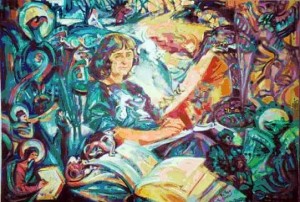 We come out of our mothers, propagating the intricate and long lines of genes that go back to the beginning of man. Society, community, environment, personal experiences contribute to the formation of our physical growth and characters. Parents, siblings, teachers, lovers, friends, affect our views in life. We keep changing and growing. We are never one thing. Who are we? Who am I? The proper time to define ourselves is after we’re dead.
We come out of our mothers, propagating the intricate and long lines of genes that go back to the beginning of man. Society, community, environment, personal experiences contribute to the formation of our physical growth and characters. Parents, siblings, teachers, lovers, friends, affect our views in life. We keep changing and growing. We are never one thing. Who are we? Who am I? The proper time to define ourselves is after we’re dead.
Maybe that’s how we can look at a poem too. Sure it has a mother. But after it is born it might be quoted, cut up, or translated into another language. It might be edited and interpreted, with or without the poet’s knowledge.
In old China, a painting was considered more valuable if a respected poet put commentary on it. What about poems? Can one poem dialogue with another? Can they argue? Can they metamorphosize? At the end of the day, what’s important is the emergence of something new and exciting out of the ocean of literature. The poet has gifted the world with a poem. May it evolve.
image taken from http://thewritersalleys.blogspot.com

When wor(l)ds collide…When I do workshops, I have one person read a poem aloud. Then I have another person read a poem aloud. Then I have the two persons read the two poems simultaneously. How do the poems change–and they do change–when you do that? It’s fun, and you hear your words affected by someone else’s: the collision of words. This is not the notion of the “individual” writer alone in his/her room writing from his/her soul, making a privileged, unassailable utterance. Suddenly the poem is out in the world, encountering another poem–colliding with it. What arises out of this collision, as your words take on a different meaning from their encounter with another’s? “Who am I?” is a question like “What is life?” or “What is poetry?” It is a question about essences. But if there are no essences, there is no I either. What if we are more like a force field–or, as James Broughton would have put it, more like an ocean than like an “I”? What if we and our poetry are unsum-up-able?
We all scream for “I” scream.